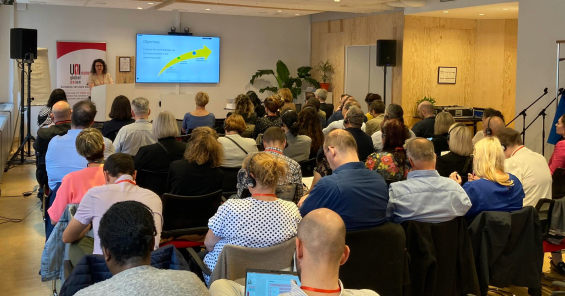Banking 2030 – addressing AI risks through social dialogue

Artificial intelligence (AI) and digital technologies are rapidly transforming the banking sector and the way it operates. While these advancements offer many benefits, they are also having a major impact on workers and their conditions.
One of the key challenges that workers in the banking sector face is the need for new skills to use the new digital tools, including AI. Employers need to ensure their workforce receive training and upskilling opportunities.
Another concern is around the ethical use of AI and algorithms, data protection, monitoring, and surveillance. AI and digital tools enable the collection and analysis of vast amounts of data – the workers’ and the customers’ – but how is this personal data being used? Biased algorithms and AI also have consequences, such as perpetuating discrimination and inequalities. The lack of transparency in how algorithms and AI make decisions further raises ethical concerns.
Social Partner Project
To address these issues, the European bank sector social partners (UNI Europa Finance and the employers’ organisations EBF, EACB, ESBG) have launched an EU-funded project titled “Banking 2030 – How will the current global trends and especially Artificial Intelligence (AI), shape the future of the European banking industry and its employees?”
The project’s first workshop was held in Paris on 17 February 2023. It focussed on key megatrends that are transforming the banking sector, including digitalization, new technologies, and AI.
The workshop emphasized the relevance of social dialogue as a way to anticipate and deal with change. The social partners recognise that they have a key role to play in shaping the use of digital tools from the get-go through social dialogue and collective bargaining. They need to work together to manage digital and other future trends and ensure that there is no negative impact and to shape the transition in a responsible way.
Several speakers emphasised the importance of social dialogue and collective bargaining in managing the digital transition in a responsible and ethical manner. Mark Pearson, the Deputy Director of the Directorate for Employment, Labour and Social Affairs at the OECD, noted that collective bargaining is key to ensuring proper upskilling and training for workers, and helping them adapt to the new workplace.
Bianca Cuciniello, Vice President at TUAC, OECD, highlighted the “human in control” principle as essential for a responsible and ethical use of AI, and called for a digital transition that fosters inclusion. Michael Budolfsen, the UNI Europa Finance President, stressed the need for proactive engagement by social partners and the importance of ensuring workers receive training and reskilling to adapt to the digital transformation of the workplace.
Eric Peres, the General Secretary of FO Cadres, France, called on unions to be vigilant on how AI is introduced in the workplace, especially regarding surveillance. He also called for inviting actual developers to join social dialogue and collective negotiations to ensure that tools used in the workplace are responsible and ethical.
In conclusion, the increasing use of AI and digital technologies in the banking sector is having a significant impact on workers and their conditions. There is a clear need for social dialogue and collective bargaining to manage the impact of AI on the banking sector, including ensuring proper upskilling and training for workers, fostering inclusion, and preventing negative effects such as surveillance and bias. The project elevates the practices that do just that.
The next project workshop will be taking place in Stockholm on 13 June 2023.
This project is possible thanks to the financial support of the European Union.
You may also be interested in

Moving forward with digital and green transitions in commerce
13.08.24
News
Project
Meetings & Events
2024
05
Nov
-
06
Nov
Regional Workshop on Collective Bargaining National Action Plans
This workshop will focus on policy initiatives that can enhance collective bargaining in countries with mostly company level bargaining. It is specifically aimed at UNI Europa affiliates from Estonia, Latvia, Lithuania, Poland, Greece, Romania, Slovakia, Hungary and Bulgaria
14
Nov
Protected: Final Conference – ARCO PROJECT – ADDRESSING REMOTE WORK THROUGH COLLECTIVE BARGAINING AND ORGANISING – 14 November 2024 – ANTWERP, BELGIUM
Finance
ICT & Related Services
On 14th November the Conference will end with a cocktail/buffet reception.
Timings: TBC
14
Nov
Protected: Final Conference – ARCO PROJECT – ADDRESSING REMOTE WORK THROUGH COLLECTIVE BARGAINING AND ORGANISING – 14 November 2024 – ANTWERP, BELGIUM
Finance
ICT & Related Services
On 14th November the Conference will end with a cocktail/buffet reception.
Timings: TBC

